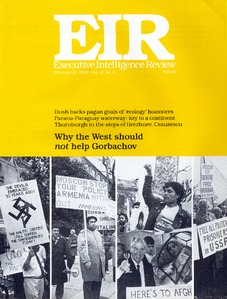Interviews
Sir Sigmund Sternberg
by Laurent Murawiec
The chairman of the International Council of Christians and Jews believes dialogue can resolve the dispute over the Carmelite convent at Auschwitz.
Nils Castro
by Carlos Wesley
The secretary for international affairs of the Democratic Revolutionary Party of Panama, currently in exile in Mexico, coordinates the office which represents the Panamanian resistance to U.S. occupation. Part II discusses the invasion’s real strategic aims—which were not the “war on drugs.”
Departments
Report from Bonn
by Rainer Apel
Industrial Development on Agenda.
Report from Rome
by Giorgio Prinzi
Regional Parties Spring Up.
Editorial
Bush “Defense” Policy.
Science & Technology
The Rise and Fall of the Greenhouse Sea-Level Hoax
by Ted Bryant
Australian geographer Ted Bryant explains why the greenhouse gang’s scenario for rising sea levels doesn’t hold much water in the real world.
Energy Insider
by Leonardo Servadio
What Is the Cost of Non-Nuclear?
Economics
German Currency Union Will Spark Economic Boom
by Rainer Apel and John Sigerson
Chancellor Kohl took a cue from American economist Lyndon H. LaRouche, in his proposal for the immediate economic and monetary union of East and West Germany.
Bush Backs the Pagan Goals of World Environmentalist Gestapo
by Rogelio A. Maduro
Bush Has Not Fooled the Economy: LaRouche
by Lyndon H. LaRouche, Jr.
‘Ecological Marshall Plan’ Proposed To Stop Economic Boom in Europe
by Mark Burdman
Thatcherism Won’t Save Argentina’s Menem
by Cynthia R. Rush
Mexico, Banks Sign Silly Debt Deal as Economy Totters on the Brink
by Peter Rush
India’s Environmentalists Halt Dam
by Susan Maitra and Ramtanu Maitra
The Paraná-Paraguay Waterway
by Lorenzo Carrasco Bazúa
Currency Rates
International Credit
by Stephen Parsons
Foreign Capital Flows into Germany
Agriculture
by Robert L. Baker
The “Hunger Law” of 1990.
Domestic Credit
by Stephen Parsons
The RJR Bond Downgrade.
Business Briefs
Feature
Why the West Should Not Help Gorbachov
by Gen. Paul-Albert Scherer (ret.)
The former head of West Germany’s military intelligence service, gives a realistic evaluation of the crisis in the Soviet Union. The most foolish thing the West could do, he argues, is to disarm now, at a time of maximum instability in the Soviet bloc. It is too late to “help” Gorbachov in any case, and no matter who replaces him, the danger of war will likely increase.
Bush Troop Cut Plan Would Keep Red Army in East Germany
by Michael Liebig
Bush and Gorbachov came to the understanding at Malta to deploy their military presence in both parts of Germany in order to assert their power interests against German unity.
LaRouche, Not Reagan, Put Russians to the Wall
International
Soviet Plenums Come and Go; Breakdown Crisis Deepens
by Konstantin George
The Central Committee ended the Communist Party’s monopoly on power, and Western media cheered. But the Soviet people know, how often in the past the Russian elite has reverted to brutal repression in response to a breakdown crisis.
U.S. Starts To Pull Plug on Ally Turkey
by Scott Thompson and Joseph Brewda
U.S. Plotted Coup against General Aoun
by Jeffrey Steinberg
U.S. Invasion of Panama Begins To Explode in Bush’s Face
by Carlos Wesley
Bush’s “tamales war” is more and more exposed as a fraud. Now even the New York Times has picked up EIR’s story on the connections of the new U.S.-installed government to drug trafficking.
Greenpeace: Millions, Power, and Methods—and Unwanted Criticism
Part IV of an EIR Investigation.
International Intelligence
National
Scandals Show Bush ‘Consensus’ Wearing Thin
by Kathleen Klenetsky
The sudden spread of revelations about CIA involvement in the S&L mess signals that even some factions of the Establishment may be getting ready to dump Bush over his miserably incompetent economic and strategic policies.
Why Bush’s Iran-Contra Gang Wants Michael Billington Jailed for Life
by Herbert Quinde
Bush Policy Leading to War, Says LaRouche
by Lyndon H. LaRouche, Jr.
Dope Bank Cops Plea; Bush Off the Hook
by Joseph Brewda
Virginia Dems Ready To Commit Suicide?
by Ronald Kokinda
In blacking out the candidacy of LaRouche associate Nancy Spannaus, they’re actually campaigning for the reelection of Republican Senator John Warner.
The Thornburgh Doctrine, Spiritual Heir of Brezhnev and Ceausescu
by Edwin Vieira, Jr.
Analyzes the new doctrine, as applied in the U.S. invasion of Panama, from the standpoint of international law.
Bennett Plan: Still No War on Drugs
by Jeffrey Steinberg
Congressional Closeup
by Kathleen Klenetsky
National News



